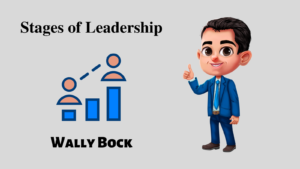Careers are different today. For decades, becoming a leader, responsible for the performance of a group, was the only way you could increase your income, flexibility, and prestige. Today that’s changing. That’s why you should determine whether leadership is the kind of work you want to do for the rest of your life.
If you have a leadership position, your job is to lead. People without a leadership position can lead, too. The big difference is that they can choose when and whether to lead. You can’t. If you’re the one responsible for the performance of a group, you’re a leader all the time.
If you don’t love your work, every day will be like a stroll through hell. In most companies, you can’t go back to being an individual contributor if you discover leadership is not your cup of tea after accepting a “promotion.” You need to learn about yourself and the work before you’re offered a leadership opportunity.
That’s the bad news. The good news is if you love leadership work, you can look forward to a career of expanding challenges and influence. Your first challenge is to determine if leadership is for you.
Are you likely to love the work?
Before you decide whether leadership is for you, seek out opportunities to try it out. Take on temporary assignments. Do some volunteer work where you have the opportunity to lead. When you have some experience under your belt, here’s what to think about.
Leadership work has two challenges. One is to accomplish the mission through the group. The other is to care for the people. Are you comfortable with that?
Are you willing to be the default decider? You must be willing to make a decision and live with the consequences even when information is incomplete and other people disagree with you.
Are you willing to put your fate in the hands of others? When you’re responsible for the performance of a group, their performance is your performance.
Do you enjoy helping other people succeed? If you don’t enjoy helping people succeed, you’ll have a hard time as a leader.
If you decide that leadership is for you, you are likely to move through some distinct stages throughout your career.
Small Team Leader
Most of the leaders in the world today are small team leaders. You’ll be working in a small group, so you’re able to know everyone.
The transition from individual contributor to team leader is the most important transition in business. It’s a tough transition because everything changes–your work, your role, and your relationships. As I wrote in my book, Now You’re the Boss: Making the Most of the Most Important Transition in Business.
“You will have many difficult times during your transition. You will have to dig deep to find the strength and resilience to deal with them. You will have to learn, often the hard way, what works for you and how to lead with your unique personality.”
You will have several challenges. You must master the basics of leadership. You must develop strong leadership habits that will serve you for the rest of your life. And you must set yourself up for lifetime learning.
Leading Several Teams
Leading several teams is likely to be the next stage in your leadership career. The total number of people may be small enough that you can still know everyone, but now you’ll be leading and developing other leaders.
That’s your challenge at this stage. You must learn to lead and develop leaders.
Leading a Whole Organization
Leading a whole organization is the final stage. If you’re in a small company, you may be the CEO. In a larger company, you might be a divisional vice president or CEO of the whole shebang. The common denominator is that you will be accountable for all the operations of the group you’re responsible for.
In this role, you’ll work with functional leaders who know far more than you about their part of the business. You’ll also have to master some new skills and extend your time horizon so you can think and act strategically.
A leadership career is a long journey with lots of rough patches and lots of rewards. Start by determining whether or not leadership work is the work you want to do for the rest of your working life. Then master the skills and meet the challenges as you grow into a seasoned leader.
Takeaways
You will probably have more non-leadership options in the future. But organizations will still need formal leaders.
People can lead without a position, but if you’re in a leadership position, leadership is your job.
Leadership is a kind of work. You must discover if you love the work.
Do you like helping others succeed?
Are you willing to decide?
Are you willing to place your fate in the hands of others?
As a small team leader, you must master the basics of leadership work.
As you develop, you must master leading and developing other leaders.
As you develop, you must extend your time horizon.


